‘The species will be more prone to disease and the risk of extinction is greater,’ says wildlife activist
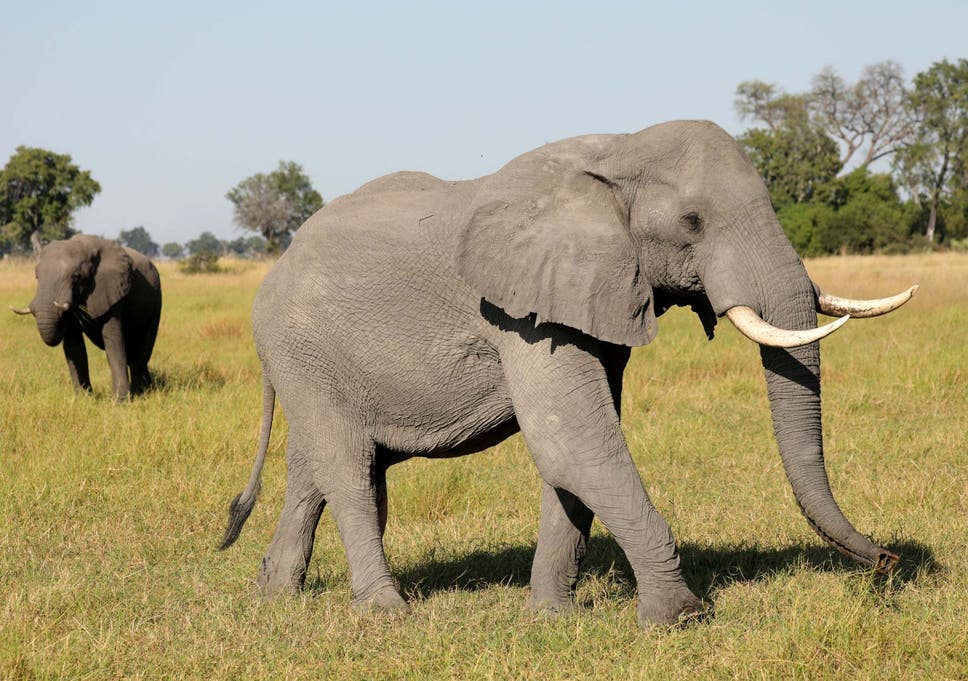
A pair of male elephants is seen in the Okavango Delta, Botswana
(File photo) ( REUTERS )
Botswana has sold licences to shoot dead dozens of elephants for tens of thousands of pounds each, in what experts are warning could be a “major global conservation disaster”.
The country auctioned off hunts for 60 of the huge mammals for a total of 25.7m Botswanan pula – £1.8m, or more than £30,200 each.
Conservationists have told the country’s leaders they risk hastening elephant extinction.
And African organisations that wanted to bid at the auction and put the money towards local community projects instead of shooting animals were angry at being excluded from the bidding.
The EMS Foundation tweeted afterwards: “Shame on you, President Masisi – we will not forget.”
Protesters demand a UK ban on imports of 'trophy hunt' animal parts
Show all 15
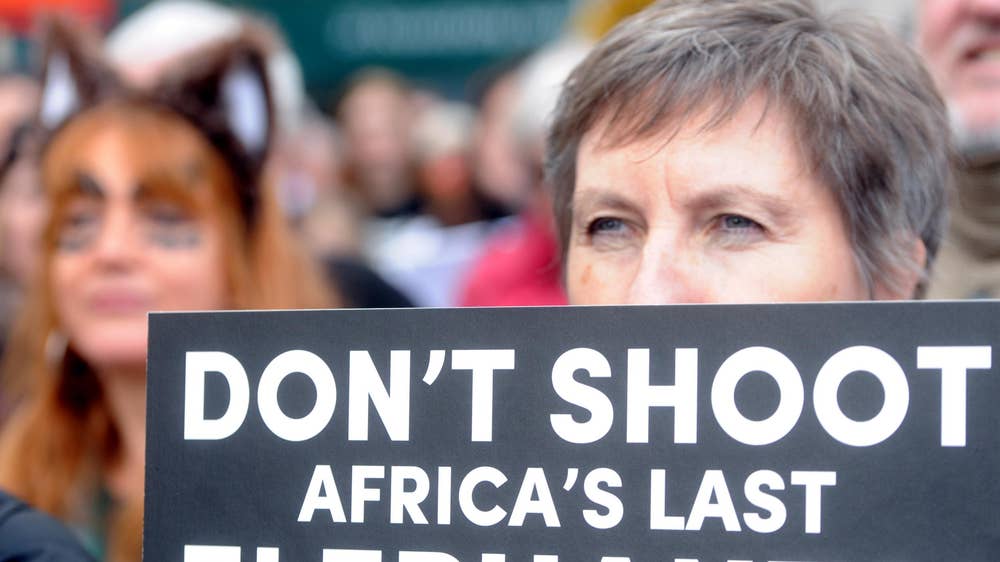
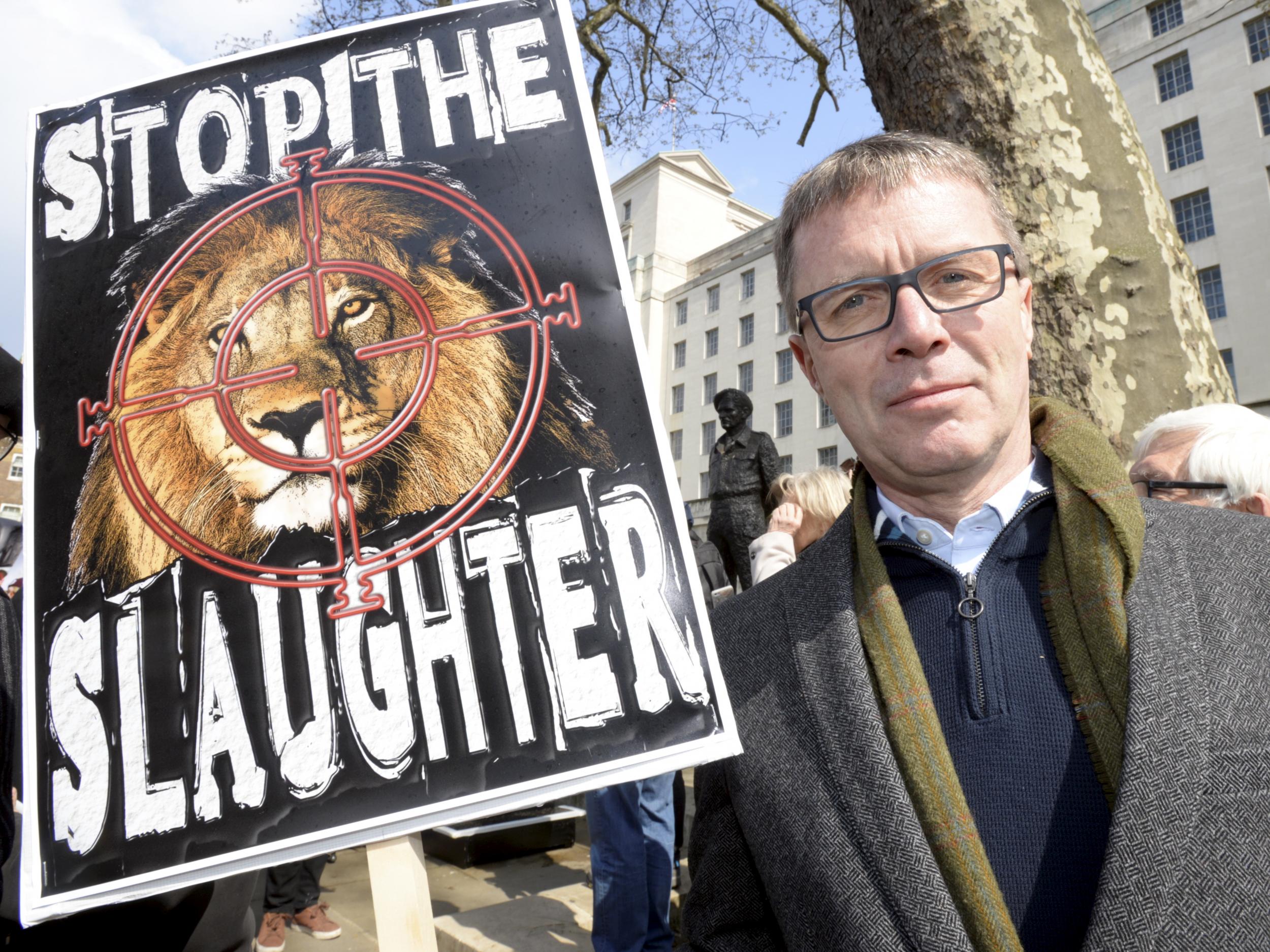
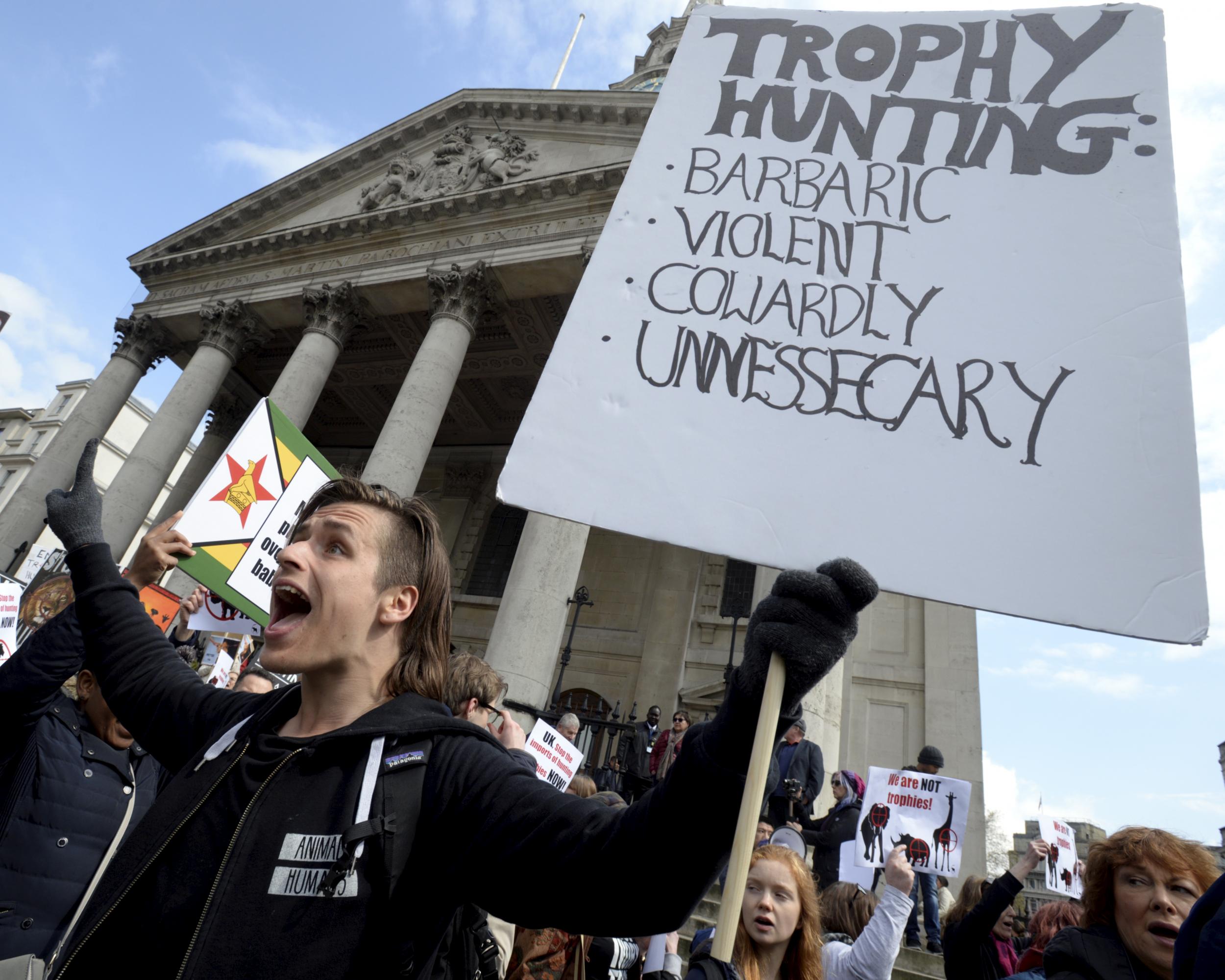
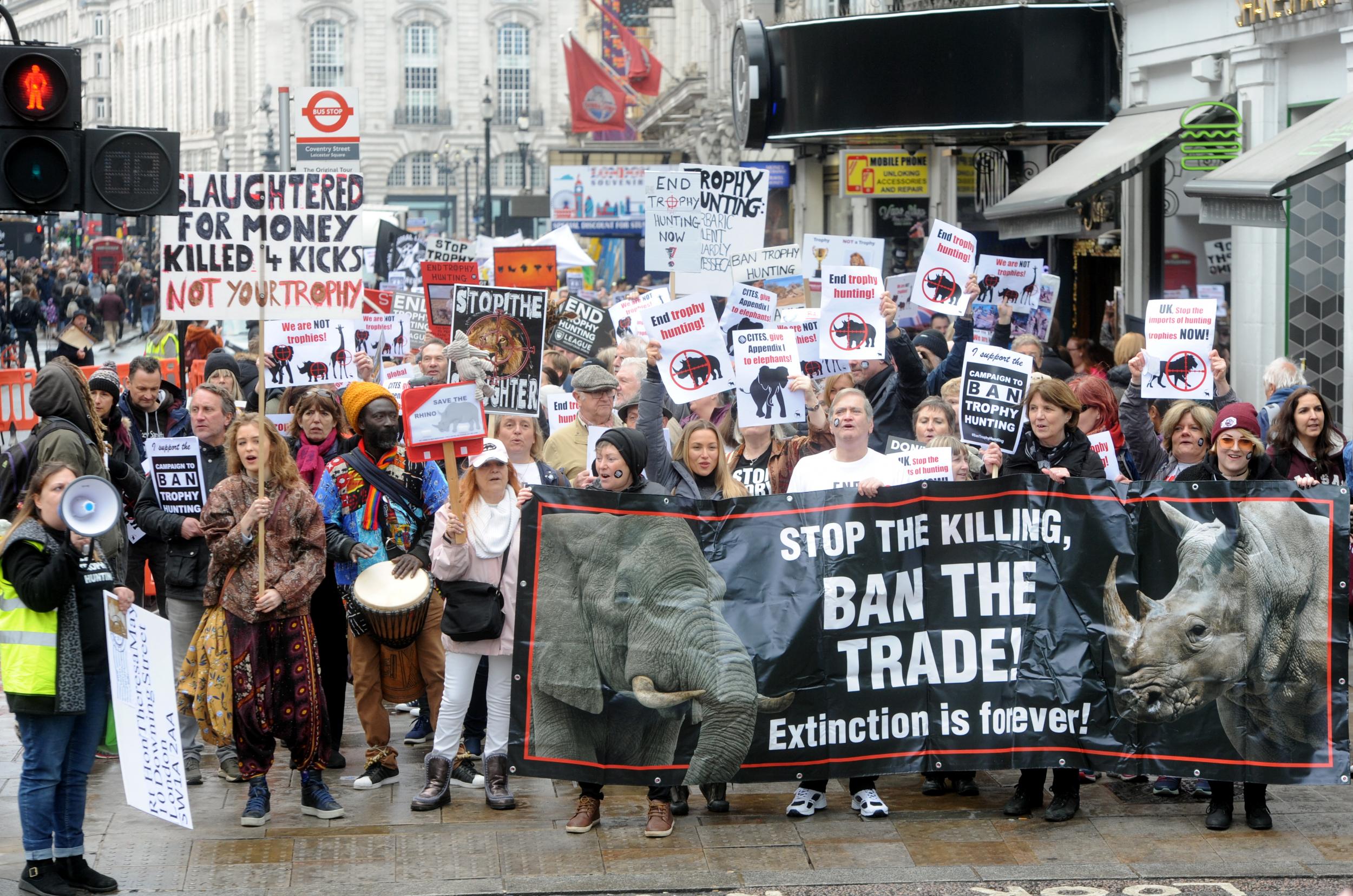
Wildlife activists had lobbied against the decision last year by Mokgweetsi Masisi to end Botswana’s five-year ban on big-game hunting.
The government has issued a quota for the killing of 272 elephants during this year’s hunting season, from April to September.
A seventh lot at Friday’s auction – to shoot 10 others - failed to meet the reserve price of 2 million pula (£141,000).
Africa’s elephant population has plummeted by more than two-thirds in 40 years: from 1.3million in 1979 to 415,000 in 2015, official figures show, and the species is listed as vulnerable to extinction by wildlife body the IUCN. Poaching is the leading cause of the decline.
But Botswana has the world’s biggest population of elephants – about 130,000 – almost one-third of the continent’s total.
Their numbers in the country have grown since the 1990s, and as humans have expanded farmland, elephants have increasingly taken crops, prompting officials to promote hunting to ease the “human-elephant conflict”.
Botswana has sold licences to shoot dead dozens of elephants for tens of thousands of pounds each, in what experts are warning could be a “major global conservation disaster”.
The country auctioned off hunts for 60 of the huge mammals for a total of 25.7m Botswanan pula – £1.8m, or more than £30,200 each.
Conservationists have told the country’s leaders they risk hastening elephant extinction.
And African organisations that wanted to bid at the auction and put the money towards local community projects instead of shooting animals were angry at being excluded from the bidding.
The EMS Foundation tweeted afterwards: “Shame on you, President Masisi – we will not forget.”
Protesters demand a UK ban on imports of 'trophy hunt' animal parts
Show all 15




Wildlife activists had lobbied against the decision last year by Mokgweetsi Masisi to end Botswana’s five-year ban on big-game hunting.
The government has issued a quota for the killing of 272 elephants during this year’s hunting season, from April to September.
A seventh lot at Friday’s auction – to shoot 10 others - failed to meet the reserve price of 2 million pula (£141,000).
Africa’s elephant population has plummeted by more than two-thirds in 40 years: from 1.3million in 1979 to 415,000 in 2015, official figures show, and the species is listed as vulnerable to extinction by wildlife body the IUCN. Poaching is the leading cause of the decline.
But Botswana has the world’s biggest population of elephants – about 130,000 – almost one-third of the continent’s total.
Their numbers in the country have grown since the 1990s, and as humans have expanded farmland, elephants have increasingly taken crops, prompting officials to promote hunting to ease the “human-elephant conflict”.
Why Botswana resents their once-loved elephants
However, some environmentalists fear licensed hunting could fuel demand for body parts and so encourage even more illegal poaching, opening the path to extinction.
Eduardo Goncalves, founder of the Campaign to Ban Trophy Hunting, told The Independent that attrition from trophy-hunting and poaching was greater than the annual birth rate of elephants in Africa.
“Scientists have noticed that trophy hunting and poaching of African elephants is leading to elephants having shorter tusks and that there are now more adult elephants with no tusks,” he said.
“Trophy hunting is artificial selection. By targeting the biggest and strongest animals, it leaves the weaker, smaller animals behind. This means the best genes are being lost, so the species will be less able to adapt to accelerating climate change, it will be more prone to disease, and the risk of extinction is greater.”
He said the move would be bad for some of Botswana’s poorest communities, as it meant one-off trophy fees replacing income streams from nature tourism of $2m (£1.5m) over an elephant’s lifetime.
A letter from wildlife experts and celebrities, including explorer Sir Ranulph Fiennes, to President Masisi when he was reconsidering the ban said: “Trophy-hunting of elephants often brings a slow, painful death. With its population dwindling and increasingly scattered, the impact of trophy-hunting could be disastrous and possibly contribute to the extinction of the species.
“This would be a major global conservation disaster – potentially the worst in living memory – and have tremendously damaging consequences for efforts to conserve endangered fauna and flora everywhere.”
The country’s government says the large sums of money from trophy-hunters benefit local communities.
Read more
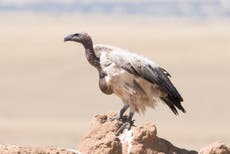
However, some environmentalists fear licensed hunting could fuel demand for body parts and so encourage even more illegal poaching, opening the path to extinction.
Eduardo Goncalves, founder of the Campaign to Ban Trophy Hunting, told The Independent that attrition from trophy-hunting and poaching was greater than the annual birth rate of elephants in Africa.
“Scientists have noticed that trophy hunting and poaching of African elephants is leading to elephants having shorter tusks and that there are now more adult elephants with no tusks,” he said.
“Trophy hunting is artificial selection. By targeting the biggest and strongest animals, it leaves the weaker, smaller animals behind. This means the best genes are being lost, so the species will be less able to adapt to accelerating climate change, it will be more prone to disease, and the risk of extinction is greater.”
He said the move would be bad for some of Botswana’s poorest communities, as it meant one-off trophy fees replacing income streams from nature tourism of $2m (£1.5m) over an elephant’s lifetime.
A letter from wildlife experts and celebrities, including explorer Sir Ranulph Fiennes, to President Masisi when he was reconsidering the ban said: “Trophy-hunting of elephants often brings a slow, painful death. With its population dwindling and increasingly scattered, the impact of trophy-hunting could be disastrous and possibly contribute to the extinction of the species.
“This would be a major global conservation disaster – potentially the worst in living memory – and have tremendously damaging consequences for efforts to conserve endangered fauna and flora everywhere.”
The country’s government says the large sums of money from trophy-hunters benefit local communities.
Read more

Hundreds of vultures die after eating poisoned elephants in Botswana
But Leslie Olonyi, an environmental lawyer from Kenya, said: “African youth are now, more than ever, alive to the truth that elephants are part of our pride and heritage to conserve and hold in trust for future generations. Shortsighted politicians, poachers, trophy-hunters and their silver bullets must never be allowed to endanger this heritage.”
Animal Defenders International appealed to people to protest outside the Botswanan embassy in their country.
Rosemary Alles, co-founder and president of the Global March for Elephants and Rhinos, said: “Studies have shown that local communities do not reap the benefits that they are promised from the hunting industry.
“Killing 272 elephants in Botswana will not control elephant numbers, it will not reduce human-elephant conflict and will not create jobs in areas where opportunities are scarce.
“Appropriate land-use planning including dedicated migratory corridors will aid elephant dispersal and increase the probability of amicable human elephant coexistence.”
When the government last year decided to allow new culls, an environment ministry spokesperson said: “Predators appear to have increased and were causing a lot of damage as they kill livestock in large numbers.
“There is a negative impact of the hunting suspension on livelihoods, particularly for community-based organisations that were previously benefiting from consumptive utilisation [of wildlife].”
Tiro Segosebe, who lives in the capital, Gaborone, said: “Elephants have killed a lot of people and destroyed livelihoods. I think government is doing the right thing in reducing their numbers.”
Last year, Botswana banned two professional hunters who shot dead a research elephant and tried to hide the evidence.
But Leslie Olonyi, an environmental lawyer from Kenya, said: “African youth are now, more than ever, alive to the truth that elephants are part of our pride and heritage to conserve and hold in trust for future generations. Shortsighted politicians, poachers, trophy-hunters and their silver bullets must never be allowed to endanger this heritage.”
Animal Defenders International appealed to people to protest outside the Botswanan embassy in their country.
Rosemary Alles, co-founder and president of the Global March for Elephants and Rhinos, said: “Studies have shown that local communities do not reap the benefits that they are promised from the hunting industry.
“Killing 272 elephants in Botswana will not control elephant numbers, it will not reduce human-elephant conflict and will not create jobs in areas where opportunities are scarce.
“Appropriate land-use planning including dedicated migratory corridors will aid elephant dispersal and increase the probability of amicable human elephant coexistence.”
When the government last year decided to allow new culls, an environment ministry spokesperson said: “Predators appear to have increased and were causing a lot of damage as they kill livestock in large numbers.
“There is a negative impact of the hunting suspension on livelihoods, particularly for community-based organisations that were previously benefiting from consumptive utilisation [of wildlife].”
Tiro Segosebe, who lives in the capital, Gaborone, said: “Elephants have killed a lot of people and destroyed livelihoods. I think government is doing the right thing in reducing their numbers.”
Last year, Botswana banned two professional hunters who shot dead a research elephant and tried to hide the evidence.
Botswana to start auction of elephant hunting licences
AFP
Botswana, home to the world's largest elephant population, on Friday was set to hold its first major auction for trophy elephant hunting quotas since scrapping a hunting ban last year.
 © Kun TIAN Map of Africa's elephant populations, with chronology of species protection measures, the ivory trade ban and poaching
© Kun TIAN Map of Africa's elephant populations, with chronology of species protection measures, the ivory trade ban and poachingThe sale will be conducted by a local firm Auction It from the premises of the Ministry of Environment, Nature Conservation and Tourism in the capital Gaborone.
President Mokgweetsi Masisi raised the ire of conservationists in May when he revoked a moratorium, just a year after he succeeded Ian Khama, an avid environmentalist, who introduced a blanket ban in 2014 to reverse a decline in the population of wild animals.

© MONIRUL BHUIYAN Botswana is auctioning licences to kill elephants by trophy hunters, a move that has sparked widespread anger
Masisi fended off criticism of his government's decision, saying the move would not threaten the elephant population.
The government is issuing seven hunting "packages" of 10 elephants each, confined to "controlled hunting areas", a wildlife spokeswoman Alice Mmolawa told AFP on Thursday.
In a text message, she said hunting would help areas most impacted by "human wildlife conflict," a reference to elephants roaming off game parks into communities.
The 2020 hunting season is expected to open in April.
Bidding is open to "companies that are either owned by Botswana citizens or are registered in Botswana," she added.
Bidders must make a refundable deposit of 200,000 pula ($18,300) to participate.
According to an auction advisory, bidders must have "demonstrable appropriate elephant hunting experience" and have no previous wildlife criminal convictions.
Hunting of collared elephants will be prohibited.
All elephant hunting expeditions will be compelled to be accompanied by a guide and a professional, at all times, according to the auction notice.
Masisi's decision to lift the hunting ban last year was highly praised by local communities but derided by conservationists and ignited tension between Khama and Masisi.
- Overpopulation -
He has defended his decision to end the hunting ban saying Botswana has an overpopulation of elephants, and pledged to regulate the practice.
His predecessor Khama was bitter.
"I have been against hunting because it represents a mentality (of) those who support it, to exploit nature for self interest that has brought about the extinction of many species worldwide," he told AFP in a phone interview.
He said allowing commercial hunting could "demotivate those who are engaged in anti poaching, who are being told to save elephants from poachers but the regime is poaching the same elephant and calling it hunting".
Audrey Delsink, Africa's wildlife director for the global conservation lobby charity Humane Society International said "the Botswanan elephant hunting auctions are deeply concerning and questionable".
"Hunting is not an effective long-term human-elephant mitigation tool or population control method," she said from neighbouring South Africa.
Neil Fitt, who heads Kalahari Conservation Society in Botswana, said hunting was a new source of revenue for the country, but cautioned it had to be practised "ethically and properly".
With unfenced parks and wide-open spaces, Botswana has the world's largest elephant population with more than 135,000 animals -- about a third of the African continent's total.
Most of the animals are in the Chobe National Park, an important tourist draw.
But elephants invade villages located near wildlife reserves, knocking down fences, destroying crops, and at times killing people.
Masisi fended off criticism of his government's decision, saying the move would not threaten the elephant population.
The government is issuing seven hunting "packages" of 10 elephants each, confined to "controlled hunting areas", a wildlife spokeswoman Alice Mmolawa told AFP on Thursday.
In a text message, she said hunting would help areas most impacted by "human wildlife conflict," a reference to elephants roaming off game parks into communities.
The 2020 hunting season is expected to open in April.
Bidding is open to "companies that are either owned by Botswana citizens or are registered in Botswana," she added.
Bidders must make a refundable deposit of 200,000 pula ($18,300) to participate.
According to an auction advisory, bidders must have "demonstrable appropriate elephant hunting experience" and have no previous wildlife criminal convictions.
Hunting of collared elephants will be prohibited.
All elephant hunting expeditions will be compelled to be accompanied by a guide and a professional, at all times, according to the auction notice.
Masisi's decision to lift the hunting ban last year was highly praised by local communities but derided by conservationists and ignited tension between Khama and Masisi.
- Overpopulation -
He has defended his decision to end the hunting ban saying Botswana has an overpopulation of elephants, and pledged to regulate the practice.
His predecessor Khama was bitter.
"I have been against hunting because it represents a mentality (of) those who support it, to exploit nature for self interest that has brought about the extinction of many species worldwide," he told AFP in a phone interview.
He said allowing commercial hunting could "demotivate those who are engaged in anti poaching, who are being told to save elephants from poachers but the regime is poaching the same elephant and calling it hunting".
Audrey Delsink, Africa's wildlife director for the global conservation lobby charity Humane Society International said "the Botswanan elephant hunting auctions are deeply concerning and questionable".
"Hunting is not an effective long-term human-elephant mitigation tool or population control method," she said from neighbouring South Africa.
Neil Fitt, who heads Kalahari Conservation Society in Botswana, said hunting was a new source of revenue for the country, but cautioned it had to be practised "ethically and properly".
With unfenced parks and wide-open spaces, Botswana has the world's largest elephant population with more than 135,000 animals -- about a third of the African continent's total.
Most of the animals are in the Chobe National Park, an important tourist draw.
But elephants invade villages located near wildlife reserves, knocking down fences, destroying crops, and at times killing people.
---30---
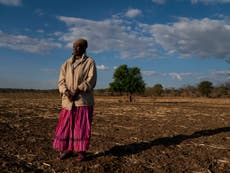
No comments:
Post a Comment